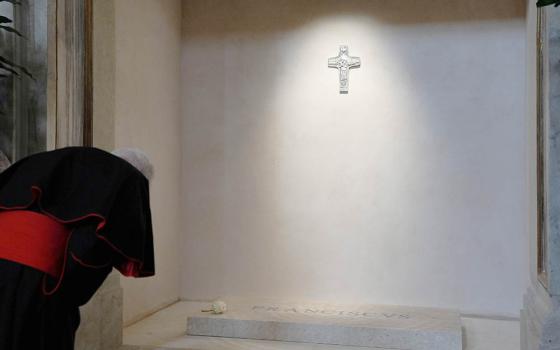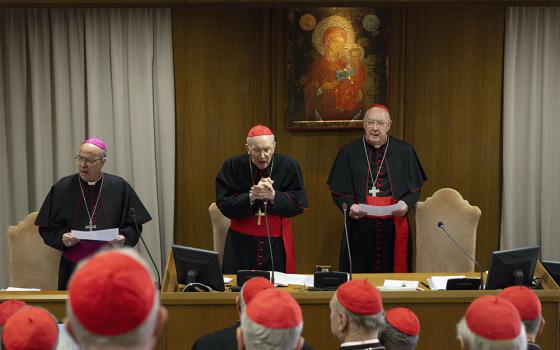Last week, I called attention to an article about Pope Francis by my friend John Gehring. As we have all come to expect from Gehring, the article was intelligently and well written. There was one paragraph, however, that gave me pause and I raised it with John. Now, with his permission, I wish to zero-in on that paragraph.
Gehring wrote:
A year into his papacy, it turns out the Francis Doctrine isn’t really much about doctrine at all. His vision to build a church “for the poor” and efforts to broaden the Catholic conversation beyond the flash points of sexual theology have lifted the spirits of many weary of culture-war Christianity. When the world’s most visible religious figure warns the faithful that “small-minded rules” hurt the church, people sit up and take notice, for good reason.
As you can see, I am largely in sympathy with Gehring’s – and Pope Francis’ – take on the need to abandon the culture war mentality, but I object, and I think Pope Francis would object, to the idea that the pope is not concerned about doctrine. I would, instead, say that the pope is asking the Church not to place its doctrines pertaining to sexual morality at the vanguard of our preaching the Gospel, or as a kind of ID card for good Catholics and, instead, highlight the social doctrine of the Church equally and, even more, focus on the Christological doctrines, which are the most important because the most foundational.
Why is any of this important? I think there are three groups of reasons, one ad intra, one ad extra, and one where the intra and extra meet.
First, the ad intra. Conservatives are never shy about invoking doctrine when they defend their positions. How many times have we heard in the past couple of years during the debate over the
The core doctrines of the Church are those we recite in the Creed every Sunday. Those core doctrines have to do with the Godhead and, most especially, with the person of Jesus Christ. And, what is revealed to us in, say, our core doctrine of the Incarnation is that human dignity has received an inestimable confirmation by God’s taking on human flesh in the person of Jesus. Our core doctrine of the salvific passion, death and resurrection of the Lord Jesus yields our understanding of God’s ineffable mercy. And, our belief in the Holy Trinity tells us that at the center of all reality, there is not an Aristotelian unmoved mover, there is not a first principle, there is not an endless series of random, scientifically observable phenomena. No, at the heart of all reality is a relationship of love, indeed, if there is a key doctrine that Pope Francis has held up for all of us this past year it is love. The Creed leads us to conclude that God is love. Love is a doctrine and, indeed, the core doctrine of our faith. This permits us a much more accessible answer to the question why we help our neighbor than any secular NGO can offer. And, all the Church’s moral and social doctrines flow from these core Christological and Trinitarian doctrines. Francis is not denying those doctrines, but he is reminding us that at the center of our faith is a commitment to love God and neighbor.
The ad extra reason for insisting on the significance of doctrine is that we must debunk the idea that if we bring dogma into the public square, the Thirty Years War is going to break out again. There is a shorthand version of history that is quite common and quite wrong, that religion has caused interminable wars through the years and is still the source of many conflicts around the world. There are varieties of religious experience, especially fundamentalisms of any creed, that do pursue their perverse propagation of the faith with violence. But, we should not throw the baby out with the baptismal water. We have every right to bring our doctrines and dogmas with us into the public square. Just as the observation, “hate the sin but love the sinner,” has become tired and blunt and useless, failing to recognize that in some instances, the judgment of the act will, of necessity, fall upon the person, similarly, we cannot disassociate our acts of Christian solidarity and compassion from their doctrinal inspiration without falsely presenting our credentials. We care for the poor out of obedience to the Lord and following His example. We are not mere do-gooders. This is what Pope Francis has so beautifully reminded us.
Which leads to the estuary where the ad intra and ad extra concerns meet. As I have observed before, modernity permits religion into the public square to serve as an ethical authority, indeed as an essential ethical authority: No religion, no solid ground for ethics; no solid ground for ethics, no people capable of self-governance; no people capable of self-governance, no civilized democracy. George Washington said as much more than 200 years ago and George Weigel says it still. Of course, Jesus Christ did not die on the Cross to serve as a prop for Americanism, but let us set that aside. If, however, we allow ourselves to adopt the role of an ethical authority in the public square, over time, we begin to see ourselves in that role, our self-understanding of what it means to be a Church begins to look like that public role. Pretty soon, the Christian Church becomes a group of finger waggerers, some on the right and some on the left to be sure, but people who have reduced religion to ethics and, just so, are halfway down the slope of secularization before they know it.
In our day, and in an admittedly perverse way, this reduction of religion to ethics is abetted by two otherwise worthy developments: ecumenism and shared moral concern. We should certainly work with our Protestant, and Jewish and Muslim, and secular brothers and sisters to alleviate human suffering. In our pluralistic culture, we have learned that we must be respectful of differing beliefs and so we tend not to bring them up in public. Pretty soon, you have the “Moral Majority,” which united Christians of differing beliefs behind a set of shared moral concerns and, voila, religion is yet further reduced to ethics. Similarly, I have no objection to working with secular groups, for example, in the effort to stop human trafficking, but they must know we undertake this work from a specifically religious starting point. Otherwise, we have little to say when the government cancels a contract with an agency of the Catholic Church that effectively helps the victims of human trafficking because we will not promote practices we think are morally damaging.
In the past several decades, Christian and Catholic conservatives have failed to resist the secularization wrought by an emerging and now triumphant consumer capitalism. We on the Christian and Catholic left must not make the same mistake by thinking it inappropriate or odd to tell our fellow progressives that we help the poor in obedience to the Lord. All Catholics, of all political and ideological stripes, need to re-focus themselves on the core doctrines of our faith. This, I submit, is what Pope Francis is trying to do. The mercy of God, the love of God, the human dignity of all, these are the core doctrines that we must embrace and defend, but our defense must be characterized by utter humility in part because we all so easily and so often offend against them! And, these doctrines shape all that we do. Any attempt to set doctrine against a Christian way of life, or any attempt to denude the Church of its dogmatic core, these must be resisted, especially in the public square which is only too happy to request that we Catholics leave our dogmas at the door when we enter that public square.



